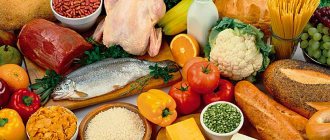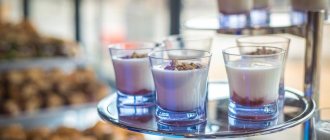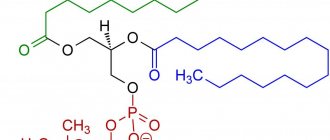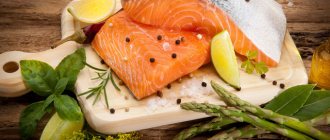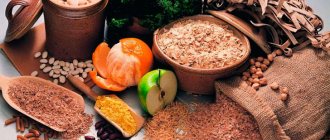“Space diet” by Sergei Sivokho: without denying himself anything, the comedian lost 42 kg in 3 months
According to statistics, 90% of the population of our country suffers from various diseases of the gastrointestinal tract, which is associated with poor nutrition, snacking on the go, and systematic consumption of fast food. If any disease of the digestive system (stomach, intestines, gall bladder) is detected, many immediately decide to start taking medications, which is not always relevant, because special diets have been developed for the treatment and prevention of gastrointestinal diseases.
Dairy products
Fermented milk products contain a lot of beneficial bacteria, yeast, proteins, minerals and essential amino acids that cannot be synthesized by the body on its own. Such products are well absorbed, since they are already partially broken down by bacterial agents.
According to scientists, microorganisms in fermented milk products stimulate secretory activity (increase the production of digestive juices), prevent putrefaction processes (it is these processes that lead to bloating and stool disorders), and normalize peristalsis.
Russian biologist I.I. Mechnikov believed that one of the main reasons for the aging of the body is the effect of poisons, the formation of which occurs as a result of the activity of putrefactive bacteria. An acidic environment creates an unsuitable habitat for pathogenic flora. Therefore, the professor recommended consuming kefir, yogurt, and yogurt more often.
Kefir contains large amounts of tryptophan, which helps relax the smooth muscles of the intestines. It is recommended to drink the drink for any digestive disorders or prolonged fasting (which is why it is part of most diets).
According to Brazilian microbiologists, kefir inhibits the activity of enterobacteria, clostridia and other pathogenic agents, and is effective during the rehabilitation period after surgical interventions in various parts of the gastrointestinal tract. The product is even used to treat gastric and duodenal ulcers.
Yogurt contains a large number of probiotics, which represent beneficial flora, contribute to the inhibition of the vital activity of pathogenic and opportunistic microorganisms in the intestinal lumen, thereby preventing the development of dysbiosis. This is relevant for pathologies of the immune system and long-term treatment with antibiotics.
It has been proven that probiotics improve the absorption of lactose even in individuals who are intolerant to this component. Helps prevent functional disorders of the gastrointestinal tract (constipation or diarrhea).
Fermented milk products contain many beneficial bacteria that improve all components of the nutrient absorption process and prevent the development of diseases in the gastrointestinal tract. They definitely need to be included in the diet.
Sample one-day menu
To avoid digestive problems, you can eat according to the following scheme:
- Breakfast. Oatmeal;
- Lunch. a bunch of greens, a small piece of whole grain bread, tea with milk;
- Dinner. Vegetarian soup, boiled veal, stewed vegetables, green tea;
- Afternoon snack. Baked apple, glass of kefir;
- Dinner. Mashed potatoes, steamed fish cutlet, rosehip infusion.
Between meals you are allowed to drink non-carbonated mineral water, unsweetened compote, fruit drinks, and non-acidic natural juice.
If the above rules are observed, intestinal function will be quickly restored , the general condition of the skin and nails will improve, and the psycho-emotional state will be normalized.
Apples
An apple consists of approximately 77% water, the rest of the volume belongs to dietary fiber (pectin and cellulose), organic acids, vitamins (A, B1, B3, ascorbic and nicotinic acids), macro- and microelements (potassium, calcium, iron, magnesium, phosphorus, sodium).
The most important role, according to scientific sources, belongs to pectin, which during the digestion process binds to a number of harmful substances (mercury, lead, cobalt, cholesterol) and promotes their removal from the small intestine. Once in the end sections of the digestive tube, pectin is broken down by bacteria and absorbed.
Apples normalize the formation of feces. Since ancient times, they have been used to treat constipation and diarrhea. To do this, it is enough to eat 1-2 ripe fruits in the morning for several days. Apples also stop the growth of cancer cells due to their antioxidant effect.
Apples are widely used in dietetics. They contribute to the rapid development of a feeling of fullness in the stomach, but contain few calories. This feature also leads to an increase in stool volume and the elimination of fecal stones. Research is underway regarding the anti-inflammatory effects of apples.
Apples, due to their dietary fiber content, normalize the movement of feces through various parts of the gastrointestinal tract, remove toxic substances and can have a beneficial effect in inflammatory processes.
Diets and fasting days
Fasting days and diets allow you to rest the body, the digestive tract, remove toxins (self-cleaning process), renew cells, and normalize excretory processes. It is necessary to limit the consumption of fats, introduce vegetables, fruits, and nuts into the diet, which enrich the body with vitamins and organic substances.
A diet to improve digestion excludes the following foods:
- Fatty meat, broths;
- Fried, smoked, salted, pickled dishes;
- Legumes, cabbage, grapes;
- Pasta;
- Baking, freshly baked bread;
- Sausages, semi-finished products, cheese;
- Canned food;
- Confectionery;
- Carbonated and alcoholic drinks;
- Coffee, juices.
Authorized products:
- Vegetarian soups;
- Porridges, cereals;
- Vegetables, berries, fruits, herbs;
- Lean meat, fish, poultry;
- Lactic acid products;
- Olive, butter, vegetable oil;
- Dried fruits (dried apricots, prunes, figs);
- Herbal, green tea, rosehip decoction.
Fasting days can be carried out once every 7-10 days , it is important to drink 8 glasses of clean water a day, start the day with lemon-honey water (put 2 cups of lemon and 1 teaspoon of honey in a mug of water at night).
Fasting days promote the renewal of the intestinal epithelium, the integrity of the digestive wall, improve the hormonal system of organs and the delivery of nutrients, and activate intracellular digestion.
Recipes for a fasting day:
- Curd day. For 100 gr. cottage cheese, take 1-2 teaspoons of edible wheat bran, eat the entire portion in 4 approaches. For breakfast and dinner, drink an additional cup of kefir or rosehip infusion;
- 150 gr. Boil unpolished rice in water without salt, divide into 3 portions. For breakfast, rice can be supplemented with cinnamon, for lunch - with a grated green apple, for dinner, eat raw small carrots;
- Take 100 gr. raw and boiled carrots, boiled beets, grate on a fine grater, add 50 g. green onions, 2 tbsp. spoons of green peas, 1 clove of crushed garlic. Mix with 1 pickled cucumber, season with 2 tbsp. spoons of vegetable oil, sprinkle with lemon juice, consume throughout the day.
After the fasting day has been carried out, it is important to eat in minimal portions at least 5 times a day, and the food should be varied.
Cereals
Whole grain fibers (oats, wheat) improve digestion processes. Cereals have the following positive properties:
- Eliminate constipation. A large meta-analysis showed that cereals not only eliminate stool retention, but also normalize its consistency and stool frequency. The effect is comparable to popular laxatives (for example, lactulose).
- Improves intestinal microbiocenosis. Components of dietary fiber (inulin, starch, oligofructose) are a nutrient medium for most beneficial microorganisms living in the human intestine.
Thus, cereals normalize digestive processes by creating optimal conditions for the life of “good” microorganisms and preventing constipation.
Dried fruits
All dried fruits (especially prunes and dried apricots) perfectly cleanse the intestines - it is no coincidence that they are considered products to speed up digestion. This effect is achieved by the huge amount of fiber contained in dried fruits. Dates, raisins, figs, dried pears and apples are no less useful. They can be ground in a meat grinder or blender, mixed with nuts and homemade sweets can be made from this mixture. Everyone knows the vitamin mass with dried apricots, raisins, lemon, walnuts and honey. It is stored in the refrigerator, eating a tablespoon on an empty stomach to protect against colds and flu in the winter. In addition, prunes and dried pears have a beneficial effect on the pancreas and prevent diabetes mellitus if you do not overeat.
Dried fruits can be soaked before use - this will not only soften them, but also help remove preservatives. Naturally, the water in which they were soaked should be drained. It is better to eat dried fruits in the first half of the day, 20 minutes before breakfast, without getting carried away: 50–100 g of dried fruits is quite enough. You can use them to prepare desserts, add them to dough, cereals, salads, sauces, and also make jam and compotes. Dried fruits with meat and fish are very tasty - for example, baked pork with prunes or trout with dried apricots.
Bran
Bran, although a by-product of grain processing, is important in the human diet.
Bran, like whole grains, creates optimal living conditions for bacteria in the intestines, and also increases the mass of smooth muscle cells, which has a positive effect on the motility of the digestive tube.
Scientific research shows that bran can bind to a large complex of toxic compounds and bile acids, removing them unchanged from the body. Such ballast substances are extremely important for the whole organism, as they participate in complex physiological processes.
There is convincing evidence that bran can prevent the development of hemorrhoids, pancreatitis, diabetes, dyslipidemia and even malignant diseases.
Bran normalizes intestinal motility, improves the conditions for the existence of beneficial flora, which has a beneficial effect on all stages of nutrient absorption.
Pumpkin
Pumpkin is one of the most useful foods for improving intestinal function. Its pulp contains a lot of pectins, which help gently cleanse the digestive system and stimulate intestinal motility. It is best to consume this vegetable in baked form. The good thing about pumpkin is that you can prepare a lot of dishes from it: from desserts to pureed soups.
We already know a lot about healthy foods, but which foods are harmful to the intestines? These are primarily fried foods, fast food, products with chemical additives, smoked foods, sweets and heavy baked goods. If it is difficult to refuse all these temptations at once, reduce the amount of their consumption to a minimum and increase the share of healthy foods. Then the digestive system will thank you very much!
Beet
Beets contain betaine and betanin, which are involved in fat metabolism and normalize liver function. Beets are also rich in fiber, which stimulates the production of digestive juices, which accelerates enzymatic processes and increases the rate of movement of chyme in the lumen of the gastrointestinal tract.
In addition, beets support the growth of essential microorganisms. At the same time, the availability of a nutrient medium for bacteria is extremely high. For example, from 136 g of beets unchanged, as much as 3.4 g of fiber reaches the large intestine, which is significantly more than most other plants.
The role of beets as a laxative and anti-inflammatory agent is currently being actively discussed. Clinical trials are underway regarding the feasibility of treating Crohn's disease with this vegetable.
We can conclude that beets are necessary for maintaining digestive processes, as they improve the secretion of gastric juice and create good conditions for the life of bacteria. Beets are recommended for hypofunction of the exocrine glands.
Ginger
Ginger root is rich in vitamins and microelements that have antiseptic properties (they destroy pathogenic bacteria on the way to the stomach, are effective against helminths) and increase the activity of digestive enzymes (the effect on lipase has been proven).
An important role is played by gingerol, which stimulates the secretion of bile into the gastrointestinal tract (indicated for the treatment of biliary dyskinesia of the hypomotor type). The product also protects the mucous membrane from exposure to any aggressive substances.
Important properties are the elimination of dyspeptic disorders (nausea, vomiting, heartburn, feeling of fullness of the stomach) by accelerating the evacuation of food particles from the stomach. Ginger quickly eliminates gastroduodenal sphincter dysfunction. Such effects are scientifically justified.
Consequently, ginger is indicated for functional disorders of the stomach, which are extremely common after surgical interventions.
Features of diet preparation for various intestinal disorders
Intestinal dysfunction in adults is treated with surgery, medications and a gentle diet. Nutritional habits directly depend on the type of disease and its severity. Only a doctor can make a correct diagnosis, so if you detect any symptoms of disease, you need to contact a specialist for help.
If a disorder of the digestive tract is noticed in a child, then under no circumstances should you self-medicate; you should immediately consult a doctor who will help determine the etymology of the disease and prescribe its correct treatment.
The most common cause of the disorder is food poisoning. In such cases, the patient may feel unwell, the body temperature rises significantly, nausea, vomiting and diarrhea appear. In case of poisoning in the first days, until the most acute symptoms subside, it is recommended to eat only liquid or puree foods. The diet should consist of medicinal decoctions, strong tea without sugar and fermented milk products with a low percentage of fat. Daily caloric intake is reduced by 20%, and in some cases by 50%.
Lemon
Lemons are approximately 10% carbohydrates, which are represented by simple sugars and soluble fibers, and contain a large amount of pectin.
Lemon effectively removes toxic substances from the intestines and slows down the absorption of various sugars and starch, which has a very beneficial effect on the glycemic background. However, to obtain the benefits, it is necessary to consume the pulp, not the juice.
Lemon should be consumed for food poisoning and for the complex treatment of diabetes.
Green vegetables
Vegetables colored green (broccoli, spinach, Brussels sprouts) are a source of insoluble fiber, which improves intestinal motility and speeds up the passage of food within standard speed limits. This helps eliminate constipation and speed up metabolism.
Green vegetables, according to American scientists, are also rich in various microelements, in particular magnesium, which increases the tone of smooth muscles, leading to faster excretion of feces.
Spinach has a separate set of properties. It is capable of capturing a number of toxic substances, including decay products, and removing them from the body.
Sugar compounds, which are extremely abundant in leafy greens, create a favorable environment for the proliferation of beneficial flora. In addition, Brussels sprouts inhibit the processes of protein synthesis in pathogenic microorganisms.
Green vegetables normalize the contractile activity of the intestine and form a “healthy” intestinal microbiocenosis.
Flavor palette
Proper nutrition should consist of the entire taste palette:
- Acidic foods – normalize metabolism, stimulate the production of hydrochloric acid;
- Bitters – promote the removal of excess fluid, prevent pastosity (swelling) of tissues;
- Sweets – increase appetite, lift mood, relax the body;
- Acute - provide energy and improve overall well-being.
Mango
Mango is rich in digestive enzymes - amylases, which are involved in the breakdown of complex carbohydrates and increase the biological value of the food consumed. Mango is also rich in dietary fiber, therefore, can be consumed for bowel problems such as constipation or diarrhea.
One large study showed that eating mangoes was much more effective than taking soluble fiber for treating long-term constipation.
We can conclude that mango improves the energy value of food, in particular complex carbohydrates, which are essential for our body. The fruit also helps prevent constipation.
Kombucha
Kombucha is fermented tea.
This drink is made by adding certain strains of bacteria, sugar and yeast to black or green tea, followed by fermentation for a week or more ().
The fermentation process produces an excess of probiotic bacteria, which can improve digestion ().
In fact, some studies on mice have shown that kombucha may help heal stomach ulcers ().
You can learn more about the beneficial properties of kombucha here - Kombucha: use and effectiveness for various diseases.
Conclusion:
The abundance of probiotic cultures in kombucha helps improve digestion and gut health. This drink can also help heal stomach ulcers.
Onion
Onions have antibacterial properties. The effectiveness of onions against Escherichia coli, Pseudomonas aeruginosa and staphylococci has been proven. The active substances in onions damage cell walls and membranes, causing the destruction of unwanted cells.
It is important to note that an experiment conducted in laboratory conditions showed an inhibitory effect against the bacterium Helicobacter Pylori, which infects almost 90% of the population. It is this microorganism that, according to the latest scientific data, causes the development of gastric ulcers.
Onions also form a nutrient medium for beneficial bacteria in the intestines (especially bifidobacteria and lactobacilli), strengthen the mucous membrane and increase the functional activity of local immune factors. These features reduce susceptibility to infectious and inflammatory diseases of any etiology.
Onions are indispensable for weakened immunity and the presence of hyposecretory pathologies of the stomach and duodenum.
Drugs for correcting digestion
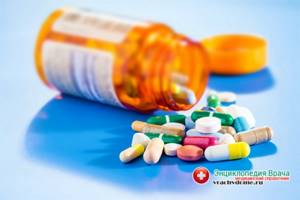
To restore digestion after poisoning, long-term use of antibiotics or alcohol, replenish enzyme deficiency, normalize intestinal microflora and cleanse the gastrointestinal tract of toxins accumulated in it, sorbents, enzyme and antacid preparations, as well as biotic additives are prescribed:
- drugs that adsorb foreign substances - activated carbon, Smecta, Polysorb, Enterosgel;
- drugs containing pancreatin - Pancreatin, Mezim, Penzital, Creon;
- drugs containing pancreatin and auxiliary components that increase intestinal activity - Festal, Enzistal, Panzinorm;
- drugs that normalize the exocrine activity of the pancreas - Somilase, Nigedase, Oraza.
- drugs that restore damaged liver cell membranes and protect the organ - Essentiale and its analogues;
- drugs that have an adsorbing and enveloping effect, helping to neutralize the excessive effect of hydrochloric acid and pepsin in the stomach - Almagel, Phosphalugel;
- probiotics containing live microcultures - Linex, Acidophilus, Bifidumbacterin, Lactobacterin.
- prebiotics containing substances that serve as a nutrient medium and stimulate the growth of beneficial bacteria - Portalak, Duphalac, Lizalak, Evict.
Do not forget that any medications to restore digestion should be taken strictly according to the instructions and only after consulting a doctor.
Nuts
Canadian scientists claim that various nuts contain enormous amounts of insoluble fiber, which is essential for ensuring adequate digestion.
Nuts also contain many prebiotics, which accelerate the development of “good” microorganisms and inhibit the activity of pathogenic flora.
A high fiber content in the diet helps reduce caloric intake, which is important for weight loss and the treatment of cardiovascular diseases.
Thus, nuts are rich in fiber, which accelerates saturation of the body and improves digestive processes.
Peach
Peach helps digestion due to its high fiber content, half of which is insoluble (1 small fruit contains 2 grams).
According to the latest scientific data, peach can be used to relieve constipation and normalize the motility of the smooth muscles of the gastrointestinal tract.
A large number of fatty acids can reduce the severity of inflammatory changes in the intestinal mucosa and improve the course of diseases such as irritable bowel syndrome, ulcerative colitis and Crohn's disease.
Peach flowers deserve special attention. They are widely used in Chinese folk medicine to increase the frequency and strength of contractions of the smooth myocytes of the digestive tube.
Thus, peaches should be taken in the presence of digestive disorders, especially when combined with chronic inflammatory pathologies.
Sauerkraut
The fermentation product of cabbage, according to laboratory observations, contains a large number of microorganisms (especially lactobacilli), which normalize the microflora and peristaltic contractions of the intestines. Surprisingly, in one serving of the dish (about 70 g) there are over 28 different stamps.
Probiotics in sauerkraut prevent the activity of harmful bacteria, reduce the absorption of various toxic substances, and help suppress autoimmune and inflammatory processes in the gastrointestinal tract.
The product also promotes the breakdown of complex fats and carbohydrates in the gastrointestinal tract, which leads to faster and more complete absorption of nutrients.
Sauerkraut is a natural source of a large number of beneficial microorganisms and contains enzymes that improve the processes of breakdown and absorption of food.
